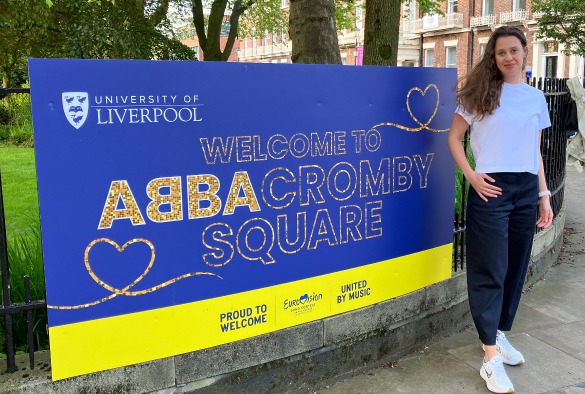
Kateryna Zhuk, is an intern research fellow from Sumy State University, studying for a PhD in Epidemiology. From the city of Sumy, in Northern Ukraine on the border with Russia, she is on placement at the University of Liverpool which is twinned with Sumy State University. Although her PhD is in Epidemiology, Kateryna is working with Rhiannon Corcoran, Professor of Psychology and Public Mental Health on a study that will evaluate the impact of the Eurovision Song Contest on the wellbeing and sense of community of local residents.
From Epidemiology to Eurovision
This year I started my internship at the University of Liverpool and I was very lucky that it coincided with a very interesting and important study to assess the impact of public events held in Liverpool during the Eurovision Song Contest 2023. As a first year Ph.D. student in Epidemiology, I agreed without hesitation to be part of this project and to help Professor Rhiannon Corcoran and her team.
Despite my background in the epidemiology of infectious diseases, which is quite different from the scope of this study, I was very enthusiastic about this work. All the basic research methods used in the study are what I, as a Ph.D. student in Epidemiology, have already had to work with.
The aim is to assess the goals and objectives of the events that take place during the Eurovision period and the cross-cutting themes of well-being and belonging, civic pride and the inclusion of the people of Liverpool. The study uses the interview method, including door-to-door interviews as well as focus group interviews. A qualitative method of analysis is used to evaluate the results.
The project is of a high importance in general and for me personally. High-profile events like Eurovision affect people’s lives indirectly and directly and leave an imprint. It is important that such events give many people the opportunity to express themselves, participate, show involvement and feel national pride, belonging and unity. These are things that really matter to the population.
It should be noted that this study is closely connected with Ukraine. This is of great importance to me as a Ukrainian. After all, I can not only be useful in terms of my background in the field of Epidemiology but also as a Ukrainian-English translator and interpreter. I deeply appreciate the opportunity to participate in such a meaningful study. This is definitely a novelty not only for me but for the world as a whole. Never before have scientists assessed the impact of the Song Contest on human well-being, and I am flattered to think that the work that our team is doing will serve as some kind of example for future experiences.
More about the study…
The University of Liverpool, working in partnership with Liverpool City Council, the Department for Culture, Media and Sport and Spirit of 2012 is delivering an evaluation programme looking at whether hosting the song contest will impact the wellbeing and sense of community of local residents.
Beginning with baseline and follow-up surveys, around 1,300 residents will be asked about their engagement with Eurovision and its associated community events. The survey will investigate whether this has contributed to improved wellbeing, sense of civic pride, tolerance of difference and citizenship.
This will be followed by focus groups of people contributing or attending Eurovision events. These will explore people’s thoughts, feelings and attitudes towards Eurovision 2023 and what it has achieved for them, the City Region and for the people of Ukraine.
Find out more about the social impact studies for Eurovision here.